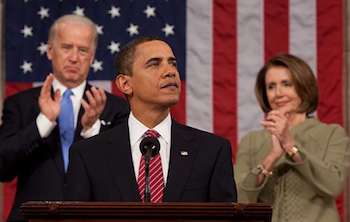- MENU
- HOME
- SEARCH
- WORLD
- MAIN
- AFRICA
- ASIA
- BALKANS
- EUROPE
- LATIN AMERICA
- MIDDLE EAST
- United Kingdom
- United States
- Argentina
- Australia
- Austria
- Benelux
- Brazil
- Canada
- China
- France
- Germany
- Greece
- Hungary
- India
- Indonesia
- Ireland
- Israel
- Italy
- Japan
- Korea
- Mexico
- New Zealand
- Pakistan
- Philippines
- Poland
- Russia
- South Africa
- Spain
- Taiwan
- Turkey
- USA
- BUSINESS
- WEALTH
- STOCKS
- TECH
- HEALTH
- LIFESTYLE
- ENTERTAINMENT
- SPORTS
- RSS
- iHaveNet.com: Politics
by Kenneth T. Walsh

President Obama
Strategists say President Obama needs to clarify his vision and explain his rationale
President Obama gave a solid State of the Union address, emphasizing the government's role in creating jobs and strengthening the economy. And there were some impressive rhetorical flourishes. But he failed to accomplish what should have been his main goal: clarifying his vision and explaining the rationale of his presidency in a compelling way, something he has failed to do all along.
Pollsters and strategists of both parties say that after more than a year, the narrative of the Obama presidency remains unclear.
Is it bringing change to Washington? That hasn't worked very well. Achieving bipartisanship? Another failure. Taking on Wall Street and other special interests? Lots of talk, not enough action to satisfy angry Americans. Serving as an international peacemaker after running as an antiwar candidate? Despite winning the Nobel Prize last year, Obama lacks credibility as he escalates the war in Afghanistan.
So far, the Obama narrative strikes many Americans as a confusing
mishmash. "On the whole, the speech was workmanlike and comprehensive
but less than memorable," says political scientist Bill
Galston of the
In a recent interview, a senior
Cornell Belcher, a Democratic pollster who advised the Obama campaign in 2008, says that over the long run, Obama needs a better message. Belcher argues that the administration has focused too much on the intricacies of legislation and not enough on vision and unifying ideas. The current theme, he says, "has no values framework, and it draws no narrative that appeals to the American people." Belcher adds, "Economic anxiety is high, and voters don't think enough has been done about it." One message from the Democrats, Belcher suggests, should be that "we have to empower people and protect people from runaway corporate greed and the predatory instincts that are out there preying on middle-class working families." Under this scenario, the Democrats would hit more aggressively at big special interests, including lenders that improperly foreclose home mortgages, banks that impose exorbitant credit card fees, and health insurers that treat consumers unfairly.
Another senior Obama adviser has a similar take: "No one in the
Just as important, Obama seems a bit tone-deaf to the morale problems
in his
But Democratic strategists say it seems a bit early for the president to be talking about being a one-termer or a lame duck. Such a negative message could further depress a party that is already reeling as it prepares for midterm elections this fall.
Available at Amazon.com:
The Political Fix: Changing the Game of American Democracy, from the Grassroots to the White House
AMERICAN POLITICS
WORLD | AFRICA | ASIA | EUROPE | LATIN AMERICA | MIDDLE EAST | UNITED STATES | ECONOMICS | EDUCATION | ENVIRONMENT | FOREIGN POLICY | POLITICS
Receive our political analysis by email by subscribing here
Obama's Presidency Lacks a Strong Narrative | Kenneth T. Walsh
© Tribune Media Services